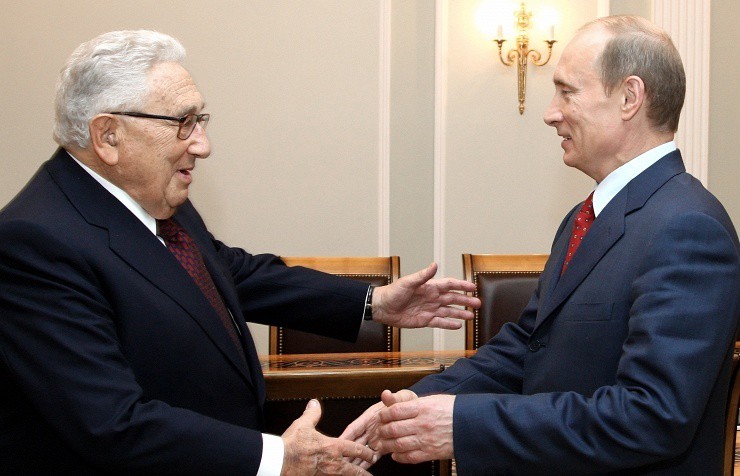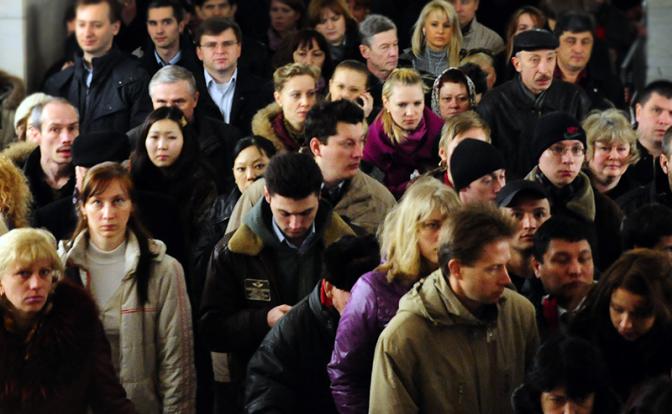Putin is at war with the US, not with Ukraine. And his victory over the US will depend not on Ukraine's "neutrality" but on the recreation of the Russian Empire and its spheres of influence, at least within the borders of the Soviet Union.
Thomas Graham, a US diplomat and close collaborator of former Secretary of State Henry Kissinger (he is managing director of the New York-based consulting firm Kissinger Associates -- Ed.) who is considered a possible candidate for the post of ambassador to Russia, gave a lengthy interview to Voice of America recently. In the interview there was much discussion not only about Russia but also about Ukraine. It is now becoming clear how experts who claim to have influence in the new administration are thinking about the resolution of the Russian-Ukrainian conflict.
Regarding Donbas, Graham's peace settlement plan for eastern Ukraine does not differ much from the plan that was voiced at one time by Germany's Minister of Foreign Affairs Frank-Walter Steinmeier. "Sanctions should be eased in exchange for concrete actions. This is why I would break the Minsk agreements into parts and propose the lifting of certain sanctions to Moscow in exchange for their gradual implementation. That kind of approach: the step by step easing of sanctions in exchange for certain actions by Moscow can lead to a resolution of the crisis. "
Graham believes that "at this stage Moscow would find this approach attractive. Such an approach would also signal to Kyiv that Ukraine can no longer take advantage of continued stagnation to avoid making internal political decisions that are necessary to ensure the security and economic development of the country."
As we can see, there is no special consideration for Ukraine. But this does not really matter. The diplomat's main error is that the Kremlin might agree with this approach.
As we have explained before, the approach of Russian diplomacy has been based on the argument that the sanction are hurting the West. And that they should be lifted from Russia simply because it has no involvement with the "civil conflict" in the Donbas.
Putin simply does not need the approval of the West. And when Graham says that sanctions should not simply be eased, but that this must be done in exchange for concrete actions, he is putting an end to the search for mutual understanding with Moscow.
In the Kremlin they understand perfectly that any concessions on Donbas -- and the Minsk agreements provide for, among other things, the withdrawal of Russian troops from the occupied territories and the return of control over the border -- would mean the end of Russian influence in the region. Because it would become clear that Putin is leaving. And even those who today are ready to serve the enemy would look for their own paths to agreements with Kyiv or simply for escape to Russia. Putin will not agree to any "phased" implementation of the Minsk agreements in exchange for the easing of sanctions.
Graham's approach to Crimea appears even more naïve. According to Graham, "Moscow is interested in legitimizing its control over Crimea" because simply stating that "Crimea is ours and we will not discuss this issue" will appear as an inadequate reaction at some point, "especially if Russia wants to restore relations with Europe and develop the economy of Crimea."
Later in the interview he proposes a list of suggestions on how to legitimize the occupation of foreign territory using the example of the transfer of the Sudetenland to Adolf Hitler. " We can discuss compensating the Ukrainian side or holding another referendum, taking into account doubts about the legitimacy of the first referendum on joining Russia."
All this is revolting, but it does not matter. Because Graham's main error is believing that Russia is interested in any "legitimization." From Putin's point of view, everything has been legitimized a long time ago. No Graham and even no Trump would be able to force the Russian president to change the Constitution, where there is reference to the Republic of Crimea and Sevastopol. Putin will never agree either to a second referendum or, even more so, to "financial compensation." Graham's reflections on Russia's interest in the "development of Crimea's economy" appear even more ridiculous. It is as if the US diplomat were not aware of how the economy is developed in Russia and what kind of investing climate exists in the country.
So is Graham an amateur? No he is not an amateur. And Kissinger is not an amateur. And many other people who would like to normalize relations with Russia are not amateurs. They would be willing to close their eyes both to the war in Donbas and to the occupation of Crimea in exchange for cooperation with Russia. But they need assurances that the Kremlin will not go further and then they would be ready to agree to the "neutral status of Ukraine." They need Putin to give them the possibility of saving face.
But there will be neither one nor the other. Putin will not allow them to save face simply because he cannot retreat. If he retreats, it means the end of the regime. Putin will continue to advance further simply because his power is based on this imperial movement and this confrontation with the West.
Perhaps Graham really does not understand that Putin is at war with the US and not Ukraine. His victory over the US will not be based on the "neutrality" of Ukraine. Ukraine until 2013 was already a "non-aligned" state.
This is why we should not expect any compromises from Putin. This is why all the plans that are being proposed by US experts who dream about "reconciliation with the Kremlin" are doomed to complete failure. And these plans should be assessed not in terms of morality. They should be assessed in terms of realism.




